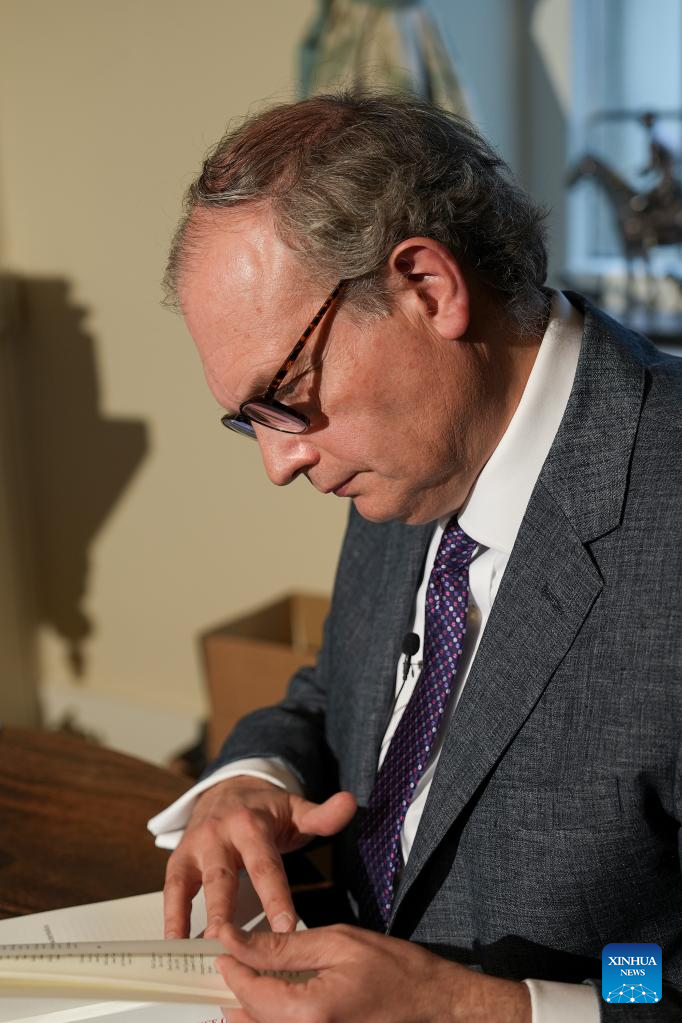
Jean Christophe Iseux von Pfetten, the chairman of the Institute for East-West Strategic Studies in Britain, poses for a photo during an interview with Xinhua in Peterborough, Britain, Feb. 15, 2023. (Xinhua/Wu Lu)
by Jean Christophe Iseux von Pfetten
We live in a time when old certainties are falling away and new approaches are being sought. The Western model of Democracy, with its stress on universal suffrage and elected politicians, seems frail. This weakness led, in the 1930s, to the collapse of the "democracies" of Europe, which crumbled fast into fascism. It appears to be happening again in many populist and right-wing movements.
The Chinese government has steered China through the most extraordinary economic and social revolution in history during the last 40 years. It has been done peacefully and without most of the terrible side effects that occurred in 19th-century Europe and America during the First Industrial Revolution.
DIFFICULTIES IN UNDERSTANDING EAST & WEST
The re-emergence of China as a considerable source of economic and political power in the international sphere, the disturbances to Western democracy, and the attempt of various people to re-establish something akin to the Cold War between the West and the East, make it essential, if we are to avert another world catastrophe, that we understand each other better. In particular, the West needs to understand how China works today.
China and the West are deeply different in their culture and history. Western thought is based on a monotheistic tradition, derived from Christianity. There is one God, and religion consists of a bundle of elements, including ritual, dogma, eschatology and ethics. In Asia, on the other hand, there is no such bundle.
At the heart of the difficulty to understand China through a Western lens is the difference in logic between the West and the East. In practical terms, Western logic gives the Western world a Judeo-Christian principle of right and wrong (or black and white, with few shades of grey), while Eastern logic gives China a Confucian "Doctrine of the Mean" (principle of harmony with many shades of grey, and little that is black or white), where everything is in a transitional state of becoming (yin and yang).
Western social structure is based on extreme individualism, particularly in the Anglo-sphere, as opposed to the group-based system of China where family comes before the individual -- the individual still being respected within the group.
There are many other deep differences. The basically competitive and aggressive, militaristic world of the West, with constant wars, struggles and fights, is totally different from the tradition of China based on harmony, the avoidance of war if possible, and collaboration rather than competition (Sun Tzu).
Few in the West know much about China -- if they have visited at all, it is to stay for a few weeks in tourist or business bubbles. They have only a vague idea of what is going on.
THE CHINESE SYSTEM MEASURED BY TOCQUEVILLE'S PRINCIPLES
There are two meanings to the word "democracy," as French political thinker Alexis de Tocqueville explains fully in his various works. One is a system, whereby you vote for people who then represent your views in a Parliament or other body. It contains a huge danger in the tendency towards the tyranny of the majority.
Another aspect of true democracy is meritocracy, namely that senior political roles are open to all, and that the most able and best trained exercise power. Its educational system through the centuries has made China far more democratic in this sense than the governmental systems of the West.
China's Socialist Consultative Democratic System (CSCDS) is my own understanding of the Chinese system after reading Xi Jinping Thought on Socialism with Chinese Characteristics in the New Era. The CSCDS is embodied by the setting of the National People's Congress (NPC), China's top legislature, and the Chinese People's Political Consultative Conference (CPPCC), a top political advisory body.
One is the NPC, where Party leaders must be elected to ensure their legitimacy, particularly since 2012. The other is the CPPCC, where there is a broader representation of citizens in accordance with civil society (a majority of whom are not CPC members).
In 1949, when Mao Zedong declared the establishment of the People's Republic of China, its constitution (i.e. the Common Program of the Chinese People's Political Consultative Conference which bore the nature of a temporary constitution) was approved by the first plenum of a newly created consultative body -- the CPPCC. CPC members usually account for less than 40 percent of the total CPPCC members. Other CPPCC members encompass a wide cross-section of Chinese society: Non-CPC political parties, mass organizations, overseas Chinese, and representatives of religious, academic and business circles. I had the extraordinary opportunity and honour of being the first person of European origin to be specially invited, in 2001, to be a member of the CPPCC, in Changchun city. The CPPCC sits once a year, shortly before the plenum of the NPC.
If we compare the idea of the Chinese democratic system or CSCDS, as it now exists, with Tocqueville's idea of a democratic system, several things are apparent.
One is that Xi Jinping's "Thoughts" place a strong emphasis on the "Rule of Law" to combine most of Montesquieu's democratic principles.
There is an increased attempt to adopt Western legal systems (away from the traditional Rule "by" Law), many of which have been incorporated, for instance in the institutions of private property, safeguarding the family and much else, but adapting them to Chinese culture and applying the ideas such as "Yang Qi," which can be interpreted as "Take the best and leave the rest" from the West.
The system places emphasis on Mao Zedong's Thoughts on "Democratic Centralism," which provide a harmony between bottom-up freedom and top-down discipline. This is a unique cultural answer to Tocqueville's recognition of the contradiction between Equality and Liberty.
The multi-party system is difficult to apply to China for reasons to do with stability. China has experienced many appalling civil wars, invasions and outside imperialist pressures. This means that it is incredibly difficult to create a system that holds together a population of almost 1.4 billion people, extending over an area as large as Western and Eastern Europe and Western Russia combined. China is also culturally hugely diverse, with many minorities and many languages.
China's 2,000-year-old imperial and bureaucratic system, established by the first Qin Emperor in 221 B.C., is being replaced by a new system, which combines old and new. This is being done through consultation within the wider society at every level of the administration and with lively debates among intra-party factions. The process answers the modern principle of multi-party representation. I have witnessed this process during my time sitting at the CPPCC in Changchun, where wide-range consultations with local farmers were conducted at a grassroot level before any changes to internal directives were implemented relating to China's entry into the WTO.
Intra-party democratic mobility via CPC committee elections works successfully from township level Committees up to the CPC Central Committee level. There is an increased influence of CPPCC decisions on NPC law-making processes. Recent examples are some new administrative directives.
There are a wide range of checks and balances within the Chinese political system, with meetings of recognized voluntary associations such the ACWF (All China Women's Federation) and the emergence of an Internet-based civil society, as external checks.
There are Special Leading Groups at central level and Discipline Commissions at every level of CPC committee as internal CPC checkpoints. Internal CPC checkpoints have been greatly reinforced in the past 10 years under Xi Jinping's guidance.
There has been a strong tradition in China that the government was the servant of the people ("Wei Renmin Fuwu"). In an age and place where the most sophisticated and widespread users of social media are present in their billions, it is easy, to express disapproval and the government is very sensitive to what the people want. This is reinforced by the central idea that, within socialism, it is the people, ultimately, who are the rulers.
There are universal secret ballots at the village level, and there are intra-party elections at the central, regional and municipal levels. Given the size of China, it is difficult to see how else to arrange such a system. For example, in my French constituency, I vote for my Member of Parliament alongside about 100,000 other people. If such a Parliament were to be established in China, I would be voting alongside well over one and a half million other people -- or, to preserve the sort of ratio I have enjoyed in France there would have to be at least 10,000 MPs in the Chinese parliament!
This was a problem with democracy from the start. Greek "democracy" (limited to free, male, reasonably wealthy, citizens) worked reasonably for a period in Athens, when the total number of citizens was 40,000. Democracy grew up in Britain, when that country had a population of about 5 to 10 million. How can we expect it to be suitable for India and China with almost 1.4 billion? India, crippled by corruption, has lately experienced significant issues with its democratic system, where the British system was originally implemented, and millions are still living in absolute poverty.
In China, CPC members progress within the ranks based on meritocracy and regional quota representation. Respect for the difference of conditions, customs and practices between the East and the West of China, as well as between the cities and the countryside, means that considerable attempts are made to balance their representation.
Other notable achievements are the anti-poverty campaign, which has raised over 700 million people out of poverty across China in the last 40 years. Chinese efforts for centuries have been about farmers, farming and the countryside.
This continues to the present. This also accounts for the fact that, in many ways, China is at the forefront in the battle to avoid environmental collapse, producing many innovative green technologies, including solar panels and electric cars. There has also been substantial re-forestation and cleaning of water supplies in the last 20 years, despite huge economic expansion.
A DEMOCRACY THAT WORKS
The Western system needs to be re-thought in the age of the Internet, heightened globalization, multiculturalism and massive technological and social changes.
The CPC's historic mission is to accomplish the rejuvenation and modernization of the Chinese nation, building-up the CSCDS to become a model that works for China, is not a threat to the world, and provides basic human rights for all. While many Western countries privilege "liberty" and individual rights, in China it is different.
More communal and less nebulous "rights" seem more important -- the rights to enough food, housing, jobs, security, peace, health, education -- and hope for the future. These are what the Chinese government has provided at an amazing pace over the last 40 years. It is not surprising, that the trust in the Chinese government by the people over the period 2016-2021 was over 90 percent, whereas it was below 40 percent in the United States, according to recent Pew Research Center polls.
For many centuries, in such a vast country, more power had to be delegated to the village level, and it is at that level that people in China, have started to vote. This opening-up of the system, along Tocquevillian lines, has been gathering pace in recent years, hugely boosted by the localized power given by virtual digital communities.
This is the direction in which, both in the East and in the West, we can live in a world where decisions of a national kind -- concerning international relations, the macro-financial system, the macro-legal system -- are made at the center, but all else is devolved down to the appropriate more local level. This is what Tocqueville admired in the England of his time and it is now within reach of the Chinese.
Editor's note: Jean Christophe Iseux von Pfetten is the chairman of the Institute for East-West Strategic Studies in Britain.
The views expressed in this article are those of the author and do not necessarily reflect the positions of Xinhua News Agency.

Jean Christophe Iseux von Pfetten, the chairman of the Institute for East-West Strategic Studies in Britain, reads documents during an interview with Xinhua in Peterborough, Britain, Feb. 15, 2023. (Xinhua/Wu Lu)



